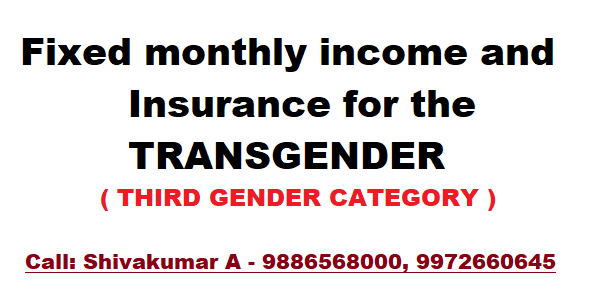Fixed monthly income for the TRANSGENDER – THIRD GENDER CATEGORY
Fixed Monthly Income for Regular Income in Old Age
Thank you for reading this post, don't forget to subscribe!In many societies, the third gender community often faces discrimination, marginalization, and economic hardships. Among the numerous challenges they encounter, financial instability in old age stands as a significant concern. Addressing this issue requires proactive measures to provide a fixed monthly income, ensuring financial security and dignity in their later years.

As per the LIC of India, every Indian should have an insurance policy. With this aim, LIC introduced the THIRD GENDER category in the personal details section in 2016.
Fixed monthly income for the TRANSGENDER – THIRD GENDER CATEGORY
The third gender community often faces systemic barriers that limit their access to education, employment, and healthcare, resulting in economic vulnerability. Discrimination and stigma in the job market lead to limited employment opportunities, pushing many into informal and low-paying sectors. Moreover, societal ostracization often leads to isolation and a lack of family support, exacerbating their financial challenges in old age.
Importance of Fixed Monthly Income:
A fixed monthly income plays a crucial role in ensuring financial stability and independence for the third gender community, particularly in their old age. It provides them with a predictable source of income to meet their basic needs, including food, shelter, healthcare, and social participation. Additionally, a regular income stream empowers them to plan for the future, invest in education, and save for emergencies, thereby breaking the cycle of poverty and dependence.
Policy Interventions:
Governments and policymakers must implement inclusive policies aimed at providing a fixed monthly income for the third gender community, especially in their old age. This can be achieved through various means, including:
- Social Welfare Programs: Establishing dedicated social welfare programs tailored to the needs of the third gender community, providing them with a monthly stipend or pension to supplement their income.
- Employment Quotas: Enforcing employment quotas in the public and private sectors to ensure fair representation and employment opportunities for the third gender community, thereby enabling them to earn a regular income.
- Skill Development Initiatives: investing in skill development programs and vocational training to equip members of the third gender community with the necessary skills and qualifications to access better-paying jobs and entrepreneurial opportunities.
- Legal Protections: Enacting anti-discrimination laws and policies that protect the rights of the third gender community in the workplace, ensuring equal opportunities and fair treatment in employment, and generating income.
- Financial Inclusion: Promoting financial inclusion by providing access to banking services, microfinance, and savings schemes tailored to the needs of the third gender community, enabling them to save and invest for their future.
Impact and Benefits:
Ensuring a fixed monthly income for the third gender community in their old age yields numerous benefits, both at individual and societal levels. It enhances their quality of life, promotes social inclusion, and upholds their dignity and rights as equal members of society. Moreover, it contributes to economic growth by harnessing the untapped potential and talents of the third gender community, fostering diversity, and reducing poverty and inequality.
In conclusion, providing a fixed monthly income for the third gender community is not only a matter of social justice but also an essential step towards inclusive development and economic empowerment. By implementing targeted policies and interventions, governments and stakeholders can pave the way for a more equitable and prosperous future, where every individual, regardless of gender identity, can age with dignity and financial security.


